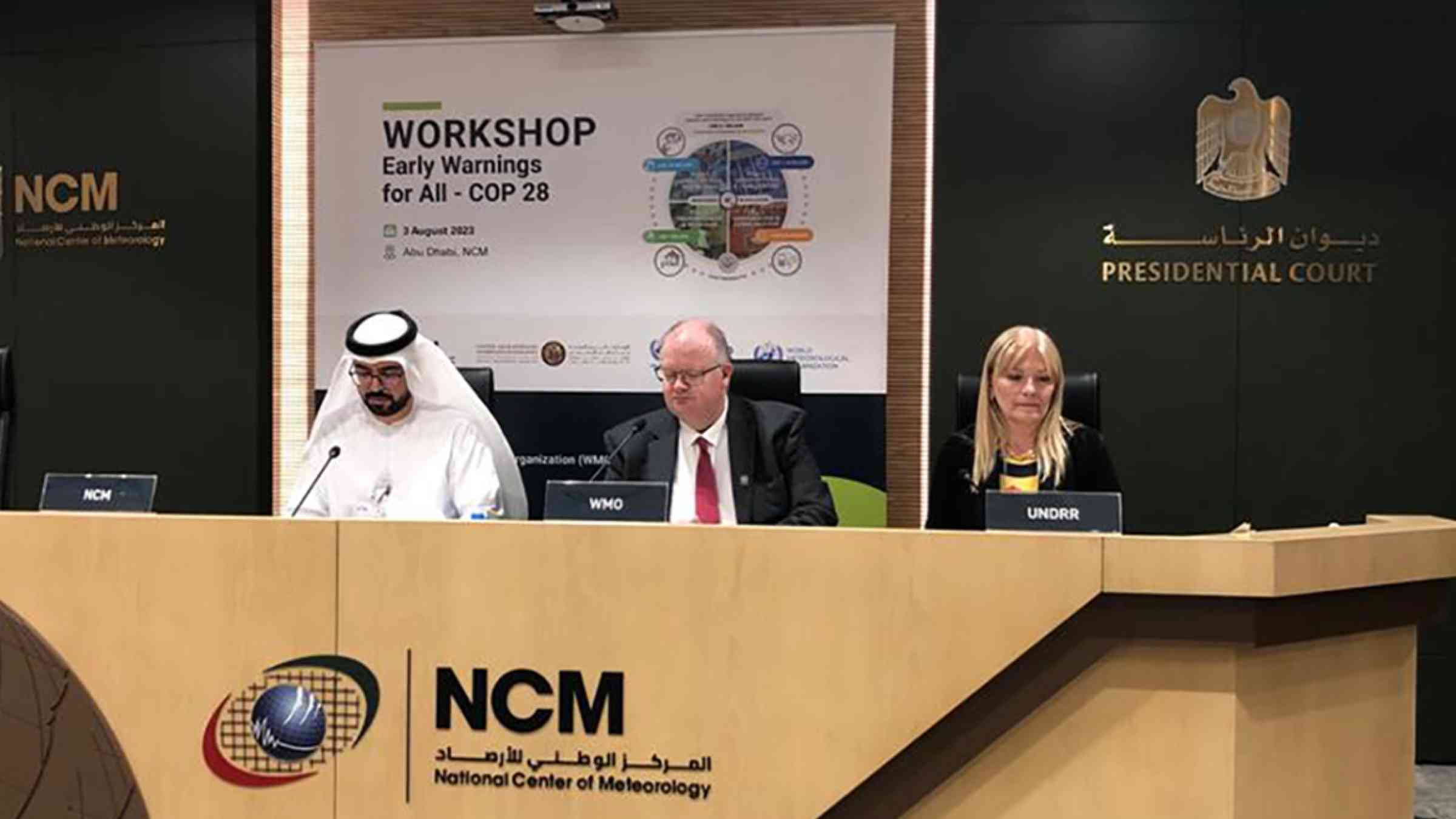Partnering for Early Warnings for All initiative: Insights from the Abu Dhabi workshop ahead of COP28

Abu Dhabi, 3 August 2023, Advances in early warning systems and preparedness have proven to be lifesaving and cost-effective, protecting tens of thousands of lives and billions of dollars in assets. By focusing on people-centered, end-to-end, multi-hazard early warning systems, we can mitigate the impact of disasters by triggering timely and well-prepared actions.
Despite the effectiveness of early warning and early action, as of 2022, only half of the world's countries have access to multi-hazard early warning systems. Developing countries face an even greater challenge, with less than half of the Least Developed Countries and only one-third of Small Island Developing States having such systems in place.
Recognizing this pressing need to improve global preparedness, the UN Secretary-General launched the Early Warnings for All initiative in March 2022, with the ambitious goal of providing early warning protection to every individual on Earth by 2027.
To address this crucial initiative, a Workshop on "Early Warnings for All – COP28" was jointly organized in Abu Dhabi by the United Nations Office for Disaster Risk Reduction (UNDRR), the UAE National Center of Meteorology (NCM), the National Emergency and Crisis Management Authority (NCEMA), and the World Meteorological Organization (WMO). The workshop centered around a pivotal initiative, "Early Warnings for All," and aimed to foster collaboration and knowledge-sharing among key stakeholders to expedite the implementation of early warning systems worldwide.
The workshop served as a vital platform for stakeholders to come together, exchange knowledge, and strategize the implementation of early warning systems worldwide. Participants were welcomed by Omar Al Yazeedi, Deputy Director General of NCM, who set the tone for a productive and collaborative event. The workshop witnessed the participation of experts and representatives from various organizations, including Paul Egerton, Director of Cabinet at WMO, and Paola Albrito, Director of UNDRR, who emphasized the political backing and support from the G-20 and international partners.
“Early Warnings for All is already being implemented in a first batch of 30 countries across five regions. However, the goal is that by the end of 2027, all countries will benefit from effective, inclusive, and multi-hazard early warning systems,” shared Albrito. “We are well aware that already much is happening in supporting SIDS, LDCs, and LLDCs in this area. We will not re-invent the wheel but will strengthen coordination among donors and partners, and focus on highlighting gaps in order to fill them.”
UNDRR aims by the end of this year to roll out on-the-ground implementation for an initial group of 30 countries, which includes SIDS, LDCs, and LLDCs, and demonstrate the ability to take a fast-tracked approach to avoid duplication, leveraging what already exists, and optimizing UNDRR comparative advantages in supporting national and local partners. In this matter, governments of the 30 countries have been informed and invited to forge partnerships. This is crucial for the countries to have ownership of their EWSs and empowers them to make these systems sustainable for the long term.
Intriguing discussions during the workshop focused on the implementation of the ‘Early Warnings For All’ initiative and the main pillars of its Action Plan on the global and regional level, and participants gained valuable insights into monitoring and evaluation model and framework, financial planning mechanisms, and strategies for resource mobilization. Moreover, the workshop showcased NCEMA's expertise and contributions to the "Early Warnings for All" initiative on the local level, showcasing the UAE's commitment to reducing disaster risks.
The workshop culminated in an interactive session, fostering a dynamic exchange of ideas on how the UAE could play a pivotal role in advancing the global implementation of "Early Warnings for All" and raising visibility during COP-28.
With each passing day, the world faces ever-increasing risks from natural hazards and climate change impacts. The "Early Warnings for All" initiative serves as an opportunity to unite the efforts for a more resilient future, where early warnings transcend borders and become accessible to all, empowering people to confront the challenges ahead with strength and preparedness.